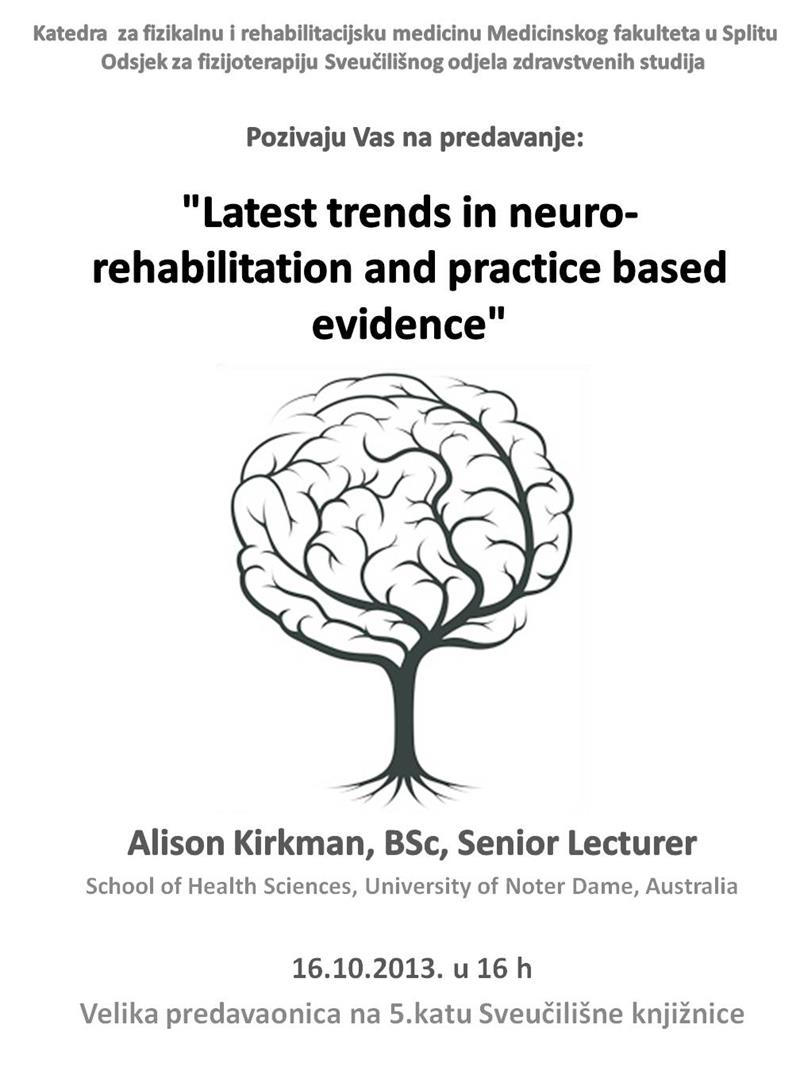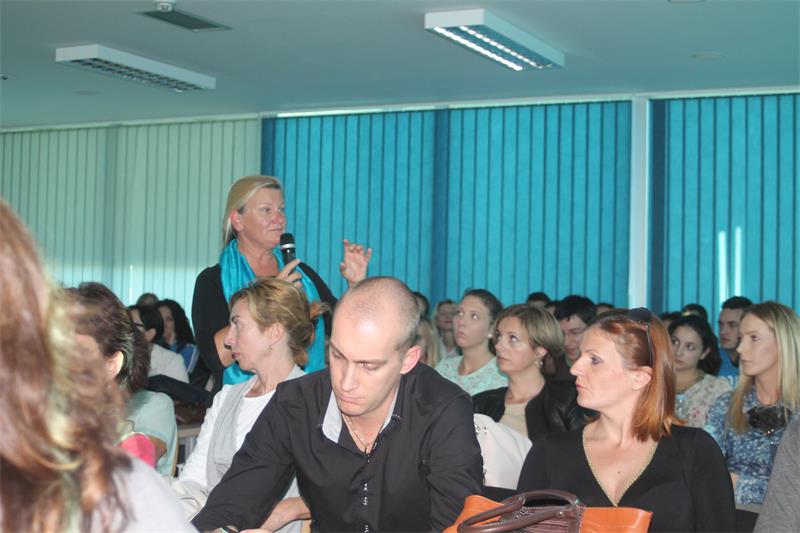alison


A talk with
Alison Kirkman ,
Senior Lecturer in Neurorehabilitation, who visited the Medical School in Split and Department of Health Studies during October 2013, as part of cooperation with the Department of Physical and Rehabilitation Medicine and the Department of Physiotherapy.
1.
Could you please introduce yourself? Where do you come from and what do you do?
I come from Perth in West Australia where I teach neuroscience at a small university in Fremantle Port. I was born in Zimbabwe, trained as a physiotherapist at the University of Cape Town in South Africa and lived and worked in Africa until 2003.
2.
In October, we had the great opportunity to listen to your lecture on “Latest Trends in Neurological Rehabilitation and Practice Based Evidence in Physiotherapy¨. How is it that you came to be in Split to give a lecture?
I read Prof. Vlak’s article on teaching rehabilitation medicine in a journal and was most interested in what he had to say. My husband and I had previously planned to go sailing from Biograd so I decided to contact him and ask if I could visit while we were in Croatia.
3.
While talking to you it seemed to me that EBM is a way of living in Australia. Why is EBM so important?
Any patient who consults a medical practitioner trusts that practitioner to provide him with the best care. That practitioner expects (often substantial) financial recompense from the patient so is obliged to provide “best care”. This dual obligation should drive a practitioner to find out which treatment really works and will provide the optimal outcome for the patient. There are many options out there so examining all the available “evidence”, particularly the results of new research, thus finding irrefutable proof that a treatment option is effective, is the most efficient way to find “best care”. Sackett’s definition of EBM, particularly the “judicious use of evidence” needs to be remembered though, as there is a tendency for clinical experience and patient values to be neglected.
4.
Patient based practice? How can you apply it to neurological rehabilitation?
When “evidence” becomes too much of a focus, the condition becomes the priority rather than the patient, and it is patients and their preferences that should always come first. Anyone who is sufficiently motivated can achieve anything they set out to. So if we, as therapists, can help motivate our patients and clients, we will achieve the best outcomes. It is paramount to remember to keep the three legs of the EBM stool (patient values, clinical expertise, best evidence) of equal length. Neurological conditions are particularly challenging because of the enormous impact they have on quality of life. At least now, with so much evidence for neuroplasticity, we no longer need to subscribe to the outdated idea that brain damage leads to disability without potential for recovery.
5.
Neuroplasticity?
This is such an exciting concept as it means that recovery is not limited by the severity of the injury. Researchers like Paul Bach-y-Rita and Michael Merzenick have shown the brain does change in response to experience and practice, and different areas can take over the functions of damaged parts. It opens a whole new world for rehabilitation.
6.
Besides EBM and neurorehab’ I know that you are passionate about student education. Could you tell us what are, in your opinion, the best ways to teach students how to study effectively and how to implement gained knowledge in practice properly?
As a physio, I am familiar with many concepts that underpin motor learning, but can also be applied to any learning. Most important is motivation - we need to combine students’ motivation to pass exams with our motivation to produce good doctors or therapists! Secondly, it is important to cater to different learning styles (visual, auditory and kinaesthetic), especially the visual with the “generation Y” population. Third in importance is providing sufficient practice, particularly of practical skills, through clinical placements. Professional and communication skills are also crucial to becoming an effective therapist and need to be incorporated into the course from the start. Key components must be assessed for the knowledge to be implemented and there is still a lot of debate as to which kind of assessment is more effective. I believe it is effective to combine formative and summative assessments, involving at least one assignment that is student-driven.
7.
Please do count five things that every teacher should keep in mind when working with students?
Passion for the subject to inspire them, humour to make the learning easier, sharing your knowledge and experience, being mindful of student workload, providing frequent and appropriate feedback to motivate and inform them so they can improve.
8.
Here I would like you to tell also a few words about that functional exercise that you are so keen about?
There is no such thing as too much exercise! There is plenty of evidence, as well as personal experience of the sense of well-being that exercise gives you, that exercise is beneficial in a multitude of ways. With our busy lives, it is very difficult to fit in a gym session or some sort of structured program so, by paying attention to “incidental exercise” we can get enough. Simple things like taking the stairs instead of a lift, parking further away from one’s destination or taking public transport that involves more walking, walking during meetings rather than sitting and drinking coffee (or do both !), walking around during lunch hour, walking the dog more often, playing actively with the children!
9.
What is the main message from your lecture for which you would like that students took with them?
The magnificent potential of neuroplasticity and just how much recovery is possible if you can motivate and engage your patient.
10.
And in the end what impressions will you take from Split?
For me, a high point was seeing the Mestrovic museum and his chapel. Croatia is exceptionally beautiful and although we saw such a small part, from Rijeka to Split and the Kornati archipelago, we had the impression of a unique and wonderfully unspoilt country. I love that the Croation people seem to be in touch with the land, everyone grows vegetables and uses local produce, and are not wasteful and consumerist. I also have the impression that Croations are really proud and patriotic and value their country which is refreshing.
Ispiši stranicu
